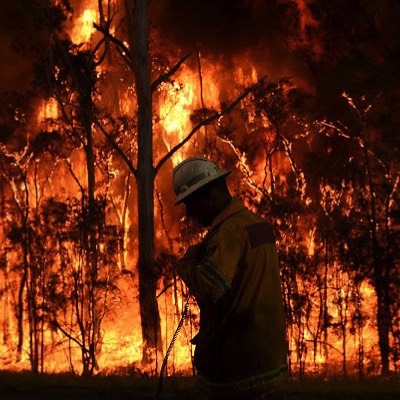Who Is Responsible?
In December and January, I responded to some of the major fires burning throughout NSW with many other volunteer firefighters from our community. But even before the fires were out, the blame game had begun. We seem to have an innate need to hold someone responsible.
Our political leaders have been on the receiving end for their perceived failure to act with appropriate urgency to address to the escalating emergency, or to respond with empathy and compassion to those whose lives had been turned upside down, or to act more broadly to mitigate the effects of climate change. There are now questions about the accuracy of climate change models themselves. Then there is the debate about whether more hazard reduction burning would have made a difference in limiting the scale of the devastation. There will be multiple formal inquiries. Inquiries can be good, if we learn from them, or they can be a way of appearing to be doing something when we’re not, or putting off doing something that we don’t want to do. Let’s hope it’s the former rather than the latter.
We’ve also seen some incredibly positive things. I may be biased, but our volunteer firefighters, and the other emergency services too, are an amazing, highly skilled, and incredibly dedicated group of people. It’s a privilege to be part of this group. It was also wonderful to see the generosity of individual Australians and businesses around Young and this nation offering assistance to fellow citizens in need. Disaster can bring out the best in people.
But I also wonder if the need to blame someone isn’t a way of avoiding having to address our own failures and shortcomings and the ways we might have contributed, through action or inaction, to the events of this summer. We certainly do that in our dealings with God. We are quick to blame him for the bad things that happen to us, as if he is under some kind of obligation to protect us, but we are very slow to admit that we don’t do the right thing by him most of the time. Not that improving our relationship with God is any guarantee that we’ll be safe from life’s disasters. The bible never makes that promise. What God does say to those who walk with him is this - “I will never fail you. I will never abandon you” (Hebrews 13:5). That is his guarantee that, whatever happens, he will be by our side. He will walk with us in the pain and loss and the outcome will always be in line with his good purposes for us, even though we may not be able to see how. That is a comforting thought. The bible goes on, “then we can say with confidence, ‘The Lord is my helper, so I will have no fear. What can mere people do to me?’” (Hebrews 13:6).
Neil Percival
Our political leaders have been on the receiving end for their perceived failure to act with appropriate urgency to address to the escalating emergency, or to respond with empathy and compassion to those whose lives had been turned upside down, or to act more broadly to mitigate the effects of climate change. There are now questions about the accuracy of climate change models themselves. Then there is the debate about whether more hazard reduction burning would have made a difference in limiting the scale of the devastation. There will be multiple formal inquiries. Inquiries can be good, if we learn from them, or they can be a way of appearing to be doing something when we’re not, or putting off doing something that we don’t want to do. Let’s hope it’s the former rather than the latter.
We’ve also seen some incredibly positive things. I may be biased, but our volunteer firefighters, and the other emergency services too, are an amazing, highly skilled, and incredibly dedicated group of people. It’s a privilege to be part of this group. It was also wonderful to see the generosity of individual Australians and businesses around Young and this nation offering assistance to fellow citizens in need. Disaster can bring out the best in people.
But I also wonder if the need to blame someone isn’t a way of avoiding having to address our own failures and shortcomings and the ways we might have contributed, through action or inaction, to the events of this summer. We certainly do that in our dealings with God. We are quick to blame him for the bad things that happen to us, as if he is under some kind of obligation to protect us, but we are very slow to admit that we don’t do the right thing by him most of the time. Not that improving our relationship with God is any guarantee that we’ll be safe from life’s disasters. The bible never makes that promise. What God does say to those who walk with him is this - “I will never fail you. I will never abandon you” (Hebrews 13:5). That is his guarantee that, whatever happens, he will be by our side. He will walk with us in the pain and loss and the outcome will always be in line with his good purposes for us, even though we may not be able to see how. That is a comforting thought. The bible goes on, “then we can say with confidence, ‘The Lord is my helper, so I will have no fear. What can mere people do to me?’” (Hebrews 13:6).
Neil Percival
